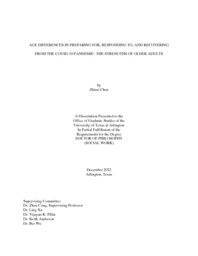
ATTENTION: The works hosted here are being migrated to a new repository that will consolidate resources, improve discoverability, and better show UTA's research impact on the global community. We will update authors as the migration progresses. Please see MavMatrix for more information.
Show simple item record
| dc.contributor.advisor | Cong, Zhen | |
| dc.creator | Chen, Zhirui | |
| dc.date.accessioned | 2023-01-26T16:14:49Z | |
| dc.date.available | 2023-01-26T16:14:49Z | |
| dc.date.created | 2022-12 | |
| dc.date.issued | 2022-12-15 | |
| dc.date.submitted | December 2022 | |
| dc.identifier.uri | http://hdl.handle.net/10106/31027 | |
| dc.description.abstract | This dissertation consists of three independent articles, investigating the age differences in preparing for the continuation of COVID-19 pandemic, experiencing negative COVID-19 impacts across multiple domains, and psychologically recovering from cumulative disaster exposures during the COVID-19 pandemic, with an emphasis on the strengths of older adults.
Data used were from the longitudinal research project “Vulnerability and Resilience to Disasters” conducted in Texas, Tennessee, and Alabama, USA. Multiple linear regressions from Article 1 (N = 450) showed that compared to those aged 65+, people aged 18-44 perceived a lower level of preparedness for the ongoing COVID-19; and there was no significant difference in perceived preparedness between people age 65+ and those aged 45-64. In Article 2, latent class analysis (N = 1,080) yielded three classes of multidimensional COVID-19 impacts: class 1 “low overall impacts”, class 2 “moderate overall impacts with high emotional distress”, and class 3 “severe overall impacts”. Subsequent multinomial logistic regressions revealed that compared to those aged 65-74, people aged 18-34, 35-49, and 50-64 had higher odds of being in “severe overall impacts” class versus “low overall impacts” class. In Article 3, negative binomial regressions (N = 554) indicated that individuals aged 65+ reported lower psychological distress relative to those aged 18-34, 35-49, and 50-64 after experiencing tornadoes and the COVID-19 pandemic, and their advantages in mental health over people under 50 can be maintained over time.
Taken together, this dissertation highlighted the unique strengths of older adults in disaster management with regard to COVID-19. Based on the findings, disaster-related practice and future research should consider age differences in disaster contexts and develop new disaster management frameworks for public health disasters. | |
| dc.format.mimetype | application/pdf | |
| dc.language.iso | en_US | |
| dc.subject | Disaster management | |
| dc.subject | COVID-19 pandemic | |
| dc.subject | Older adults | |
| dc.subject | Strengths perspective | |
| dc.subject | Disaster social work | |
| dc.title | Age Differences in Preparing for, Responding to, and Recovering from the COVID-19 Pandemic: The Strengths of Older Adults | |
| dc.type | Thesis | |
| dc.date.updated | 2023-01-26T16:14:49Z | |
| thesis.degree.department | Social Work | |
| thesis.degree.grantor | The University of Texas at Arlington | |
| thesis.degree.level | Doctoral | |
| thesis.degree.name | Doctor of Philosophy in Social Work | |
| dc.type.material | text | |
| dc.creator.orcid | 0000-0001-8228-2707 | |
Files in this item
- Name:
- CHEN-DISSERTATION-2022.pdf
- Size:
- 1.481Mb
- Format:
- PDF
This item appears in the following Collection(s)
Show simple item record


